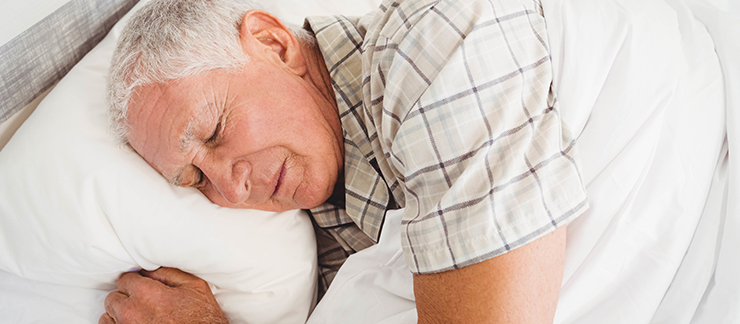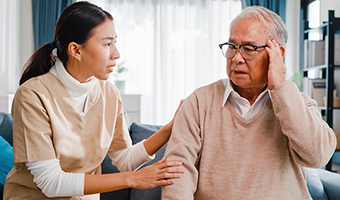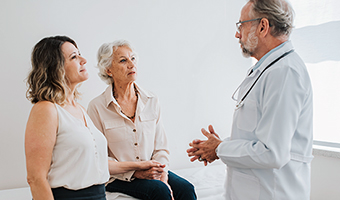Getting a Good Night Sleep Is Important for Senior Health
Did you ever have a restless night and feel groggy the entire next day? Just imagine experiencing sleep deprivation on a long-term basis. Some seniors do. The American Sleep Association reports that50-70 million adults suffer from a sleep disorder - many of them seniors. Don’t dismiss it as another side effect of aging. Contrary to popular belief, maturing adults need the same amount of sleep as they did when younger. While that number may vary for each person, it should not lessen with age. Sleep remains important to overall health and well-being for everyone at any age.
What Happens When Sleeping
When slumbering, the brain cycles through REM (rapid-eye-movement) and non-REM sleep, according to Johns Hopkins Medicine. During REM sleep, the eyes move rapidly behind closed lids, breathing rates increase, and the body becomes immobilized as muscles turn off. The stage where dreams occur, REM sleep is noted for providing energy to the brain and body.
The first sleep cycle, non-REM sleep consists of four stages. Stage 1 is when you are about to drift from wakefulness into sleep and stage 2 signals the onset of sleep, with body temperature dropping and heart rates slowing. Stages 3 and 4 are the deepest and most restorative sleep stages, where the blood pressure drops, breathing slows, muscles relax and brain waves are active. Data suggests that non-REM sleep is the most restorative phase of sleep and most important for learning and memory.
Interruption to sleep stages results in the body starting over the sleep cycle, which results in never reaching the deeper and most restorative sleep phases. Short sleep periods also make it impossible to get through all the sleep stages. Insomnia - difficulty getting to sleep or staying asleep - is a major issue among US adults over the age of 60 that disrupts the sleep cycle, causing physical and cognitive issues.
Causes of Sleeplessness Among Seniors
Aging adults don’t sleep as soundly as in their youth. A study by the National Sleep Foundation determined that 44% of older people have symptoms of insomnia - more than once per week. That’s because sleep disorders increase with age.
Older adults become sleepless for different reasons. According to WebMD, health, medication, frequent urination and sleep apnea contribute to insomnia. Some maturing seniors experience insomnia due to advanced sleep phase syndrome that causes the internal body clock to change to earlier bed and wakeup times. In addition, the pain caused by arthritis, muscular atrophy and heart problems can keep a senior awake at night.
Degenerative brain disorders such as Parkinson’s Disease (PD) and Alzheimer’s Disease (PD) also cause sleep disturbances. Frequent awakenings and sleep fragmentation are associated with PD and AD patients that causes daytime sleepiness, leading to napping that changes normal sleep patterns.
Sleep Deprivation Poses Health Risks for Seniors
Symptoms of crankiness and moodiness associated with poor sleep usually are resolvable when sleep patterns return to normal. However, chronic sleepiness leads to sleep deprivation, affecting a senior’s health in different ways.
- Cognitive impairment. Sleep, especially during the deeper stages, helps to restore the brain. Too little sleep halts new brain cell production and impairs alertness, memory and the ability to process information. Reducing nighttime sleep by as little as one and a half hours for just one night could result in a reduction of daytime alertness by as much as 32%.
- Weakened Immunity. Sleep deprivation suppresses the immune system function to produce antibodies, decreasing the body’s ability to fight colds or bacterial infections. Studies report that adults sleeping less than six hours at night are more susceptible to getting a common cold. Lack of sleep further weakens an already diminishing immune system in seniors.
- Greater Heart Disease Risk. Sleep deprivation increases blood pressure levels and the production of inflammatory agents such as C-reactive protein, which are linked with heart disease and other chronic health issues regardless of age, weight and exercise habits.
- Increased risk of obesity. Poor sleep patterns also impair the ability to maintain weight by increasing the appetite for carbohydrates and sugary foods that lead to overeating and obesity.
- Diabetes. Too little sleep messes with hormone levels, with the body producing less insulin that regulates blood sugar and secreting more stress hormones that stymie the insulin from working effectively. The joint effect is too much glucose in the bloodstream that increases the risk of developing Type 2 diabetes.
- Anxiety and/or depression. When tired due to lack of sleep, people become irritable and moody. Imagine the effects of sleep deprivation, chronic sleepiness can make a senior become depressed, sad, angry and anxious.
Tips for Better Sleep
It’s not hopeless. Different techniques employed by seniors and their caregivers may help regain a good night’s sleep. Here are some sensible tips:
- Set a Daily Schedule. Get your body used to performing tasks at the same time every day such as waking at a certain hour, eating meals or showering at set times and going to bed around the same hour every night.
- Avoid late night Coffee. The caffeine in coffee is a stimulant that can stop the body from relaxing at night. Stop consumption in the afternoon or switch to decaf coffee.
- Go Outdoors. Sun exposure helps send a message to your internal clock that day has arrived and reduces the confusion of other light signals during the night. If an individual remains indoors all day, the body might not be able to tell the difference between day and night.
- Warm Bath. Trick your body that it is time to sleep with a warm bath 90 to 120 minutes before bedtime. When getting out of the bath, the core body temperature abruptly drops, signaling that it’s ready to sleep.
- Avoid Long Daytime Naps. While power naps of 30 minutes are beneficial, long periods of daytime sleep confuses the internal clock and negatively affect nighttime sleep quality.
- Sleep in Darkness. Minimize or eliminate light through curtains or emitted from TVs, alarm clocks, or lighted rooms.
- Cool the Bedroom. Maintain a temperature no higher than 70◦ in the bedroom as higher temperatures can decrease sleep quality.
- Turn off the TV. Avoid watching TV or using a smartphone or other devices at least an hour before bed.
Be mindful when your aging loved one complaints of sleepiness. When visiting the doctor, inform them of poor sleep habits and question if certain medication or medical problems interfere with sleep. A simple adjustment to medication dosage or timing could solve the problem. Taking steps to improve their slumber can result in better attitudes and health for greater quality of life. You’ll sleep easier too.














